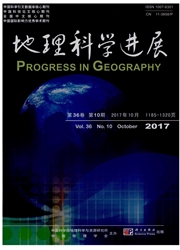

 中文摘要:
中文摘要:
地理空间思维能力是人类认识地理环境的基本能力,也是学生的地理核心素养,其影响因素及作用机制是当前迫切需要解决的基础理论问题。本文初步假设一般智力水平、生活环境特征、地理学习兴趣、地图使用习惯、地理问题关注习惯、方向敏感程度、地理专业知识等7个因素为地理空间思维能力提高的影响因素。通过样本测试取得甘肃省白银市第一中学高一年级126个学生样本的地理空间思维能力及其假设的7个影响因素数据。借助SPSS 23.0软件,运用相关分析、独立样本T检验、单因素和多元线性回归分析等方法,证实一般智力水平、地理专业知识、地图使用习惯是学生地理空间思维能力提高的必要条件,地理学习兴趣是其重要条件,上述4个因素为地理空间思维能力提高的影响因素,其作用强度从大到小依次为:一般智力水平〉地理专业知识〉地图使用习惯〉地理学习兴趣。其中一般智力水平和地理专业知识对地理空间思维能力有较强的预测作用。此外,还发现无论地理空间思维能力还是7个假设的影响因素,均未发现有显著的男女性别差异,说明上述规律具有性别普适性。
 英文摘要:
英文摘要:
Spatial thinking ability is the basic ability of understanding geographical environment and a key geographic competence of students. Its influencing factors and mechanism need urgent attention for advancing spatial thinking theory. This study hypothesized that seven factors affect spatial thinking ability, including general intelligence level, living environment, interest in geography study, habit of using maps, interest in geographical problems, sensitivity about directions, and specialized geography knowledge. The level of spatial thinking ability and the seven hypothesized influencing factors of 126 samples from the Baiyin No.1 Middle School were measured by the spatial thinking ability test(STAT) measurement scales and factors' measurement scales. The SPSS 23.0 software was used to analyze the related data. The samples were first divided into high,medium, and low score groups according to the level of spatial thinking ability, and general intelligence level,habit of using maps, and geography knowledge showed significant differences between the high and low score groups using independent sample T test. Then the samples were divided into high, medium, and low factor score groups, and general intelligence level, habit of using maps, specialized geography knowledge, and interest in geography study showed significant differences between the high and low factor score groups. The results indicate that general intelligence level, habit of using maps, and geography knowledge were necessary conditions of sample students' high spatial thinking ability, and interest in geography study was also an important condition. The four factors were proven to be the main influencing factors of spatial thinking ability, and the level of influence from high to low was general intelligence, specialized geography knowledge, habit of using maps, and interest in geography study based on the result of the single factor linear regression analysis. The stepwise regression analysis result showed that general intelligence level and sp
 同期刊论文项目
同期刊论文项目
 同项目期刊论文
同项目期刊论文
 期刊信息
期刊信息
